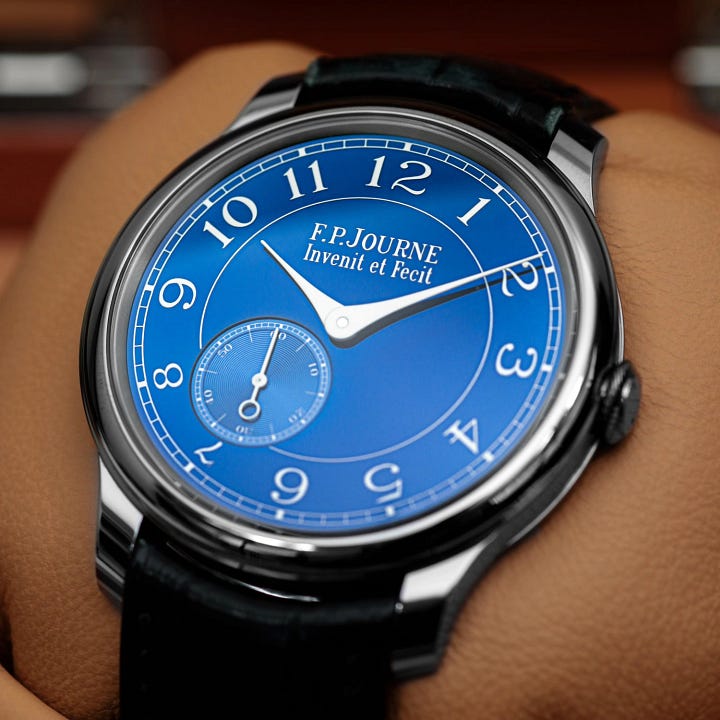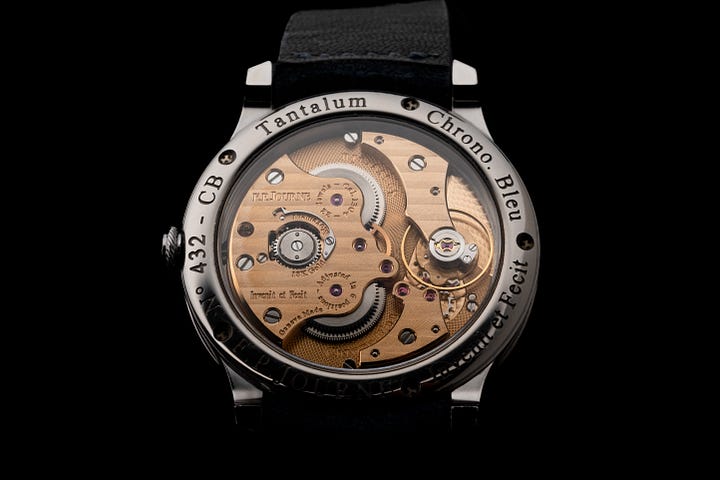Invenit et Fecit
On wristwatch ideas and fructose concepts
On the front and back of every timepiece manufactured by the independent watchmaker François-Paul Journe, there is inscribed a Latin message: Invenit et Fecit.


Years ago, it became a mantra for me. Invenit et fecit. Invented and built. Discovered and done.
In Classical Latin, you pronounce every letter—in-way-nit et (like bet) fekit. No soft syllables, no graceful elision. I’ve always liked that. For the work of invention and building is tough—fitting, then, to use phraseology that makes you eat your syllabic vegetables.
Throughout history I am sure many people moaned and whined that time could not be kept more precisely. But I don’t fondly gaze at sundials that say “I wish timepieces were more precise,” and neither does anyone else. I gaze instead at the wristwatch, invented and built.
We remember the work of they who invented and built. We do not always remember their names, but we never escape their legacy. For we climb among scaffolding they first laid down. We wander in the landscape they charted, labeled, reaped, and sowed. Their greatness and their shortcomings constitute our collective inheritance.
I picture myself on an airplane, looking down at my watch, as a string quartet streams from satellites in the heavens into the two wireless computers in my ears called AirPods.
I don’t just think of the obvious wonders. I think about the quiet ones, too. The magic that gets a string quartet performance from a concert hall to a data center to a satellite to my phone to the AirPods in my ear. The thousands of technical standards that keep the plane in the sky—standards for turbine blades, for steel, for joysticks, for radar, for the chemical content of the electrical wire sheathing.
And of course, the loud wonders, too. Rocket ships, molten ore cast to staggering precision, flying machines roaring over the land—the stuff of dreams, of cowboy ambition, crystallized for you and me in mundane moments like my airplane vignette.
All of it, invented and built, discovered and done.
Not all invention and building need happen in the form of shapen metal or poured concrete or processed silicon. It can also take place in the world of ideas and words. For meaning, too, is invented and built.
Yet it is all too easy, in this admittedly softer world, to stray into whining and fooling oneself into thinking that is work.
Recently there was proposed a “ban on artificial superintelligence until it is deemed safe by scientists and the public,” signed by more than one thousand celebrities and dignitaries. How we would define “superintelligence,” and how we would “ban” it, and how we would determine which scientists and which members of the public get to decide the thing we’ve banned is “safe,” and by what criteria they would do so, are all left undetermined.
The supporters cheered themselves on for their supposed achievement of “consensus.” But this consensus is not really about anything. It is like exiting Plato’s Cave, shouting “murder is bad!,” and mistaking that proclamation for the hard work of building a civilization with laws, law enforcement, courts, and jails.
There is no substance in this prose, no content to this consensus. I do not cheer the publication of these candy cane words, nor do I treat these high-fructose-corn-concepts as serious figures on the field of ideas.
Nothing in my critique is about “AI safety” versus “AI acceleration.” I defended AI safety policy just a few days ago in these very pages, and I have done so many times before. Instead my critique is about blubber versus substance, soft sentiment versus serious plans. Ideas like “ban superintelligence” are policy proposals based on vague sentiment, just like “defund the police” was a policy proposal based on vague sentiment. The risks for social harm are similarly large.
There are people who worked on this statement who believe they did a hard day’s work. I suppose that once there were people whose arms were tired after they scratched “we need better timepieces!” onto the sundial, though I cannot be sure. I do not know their names, and nobody bothered to preserve their work.
There is nothing wrong with squeaky whining and vague moaning. I do these things, and so do you. They are a healthy and normal part of the human condition.
It’s just that we shouldn’t fool ourselves into glorifying such behavior. We should not be happy having traveled such a short distance. There are no legacies to be laid down on this soft terrain, and no firm foundation for our monuments is to be found here. We should not pat ourselves on the back for walking only this far. We have much further to go.
There are real ideas to be crystallized—concrete policy and tools to be elucidated in the here and now, and far-flung concepts of the future to be discovered and built.
I encourage everyone reading this, but especially the young people, to go do that work. Do not be tempted by the easy and shallow “victories” of they who draft vague sentences. Do not be swayed into binging on candy corn.
If you want to write philosophy, go do it. If you want to forge tools, go do that. And if you want to write policy, then go write some actual policy, with tradeoffs, definitions, and all the rest.
But do not scribble your complaints on the sundial and call it a day.
At the very least, do not expect my sympathy or empathy when you do it. We have had too many scribblers, too much whining, too much cognitive corn syrup. We have had so much that I fear we are pre-diabetic, now, as a civilization.
No, my admiration will be always for the builders and discoverers: The people whose legacy surrounds us, the fruits of whose labor we cannot help but notice, even if we forget many of the laborers’ names.
I will reserve my praise for the tinkerers, the rotators of shapes and meaning, the benders of steel, the keepers of time, crystallizers of dreams.
Everything I write is an ode to them. And whatever tasks my hands find to do, I will do with my might. For my work will always be in the honor of they who discover and do, of they who invent and build.
Dedicated to James Proud and the team at Substrate. Congratulations on the launch.


If a young person asks me "but how to do this in policy", I have but one piece of advice: go into the weeds. Talk and argue through something that is clear. Don't ask for more money for transit, or for $20 million for transit, or for "better spacing". In high school, a friend of mine actually observed bus routes and wrote up recommendations for the MBTA about which specific stops should be removed. That is where I advise starting.
My easier life would be becoming a full time analyst, the one that matters more is building models today.